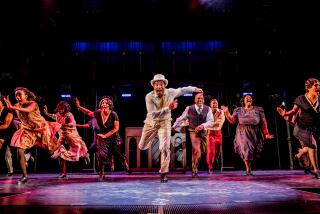Allan Carr; Producer of ‘Grease,’ ‘La Cage aux Folles’
Allan Carr, colorful producer of the classic musical motion picture “Grease” and the Tony-winning Broadway musical “La Cage aux Folles,” died Tuesday of cancer at his Beverly Hills home. He was 62.
Carr had undergone a kidney transplant in December, followed by hip surgery. He was diagnosed with cancer a month ago, according to his publicist, Warren Cowan.
The 1978 “Grease,” starring a young John Travolta, earned Carr two People’s Choice awards, one for best movie of the year and another for the year’s most popular film. He was also named producer of the year by the National Assn. of Theatre Owners. Last year, Carr earned accolades anew with the 20th anniversary re-release of the film.
“La Cage aux Folles,” which went on to become an international hit, earned Carr Broadway’s coveted Tony for producer in 1984.
He had no intention of producing the stage musical about a homosexual couple, he later recalled, but was dragged into the project in Paris during the summer of the “Grease” premiere.
“Out of politeness, I accompanied a friend to a play by Jean Poiret called ‘La Cage aux Folles,’ ” he told The Times after the musical opened in New York. “I dreaded going; I thought it was going to be another boulevard comedy in a language I wouldn’t understand. And of course that night it hit me: I had to have the American rights.”
Carr, also known as a party giver extraordinaire, had an eclectic career as the impresario who brought Britain’s Royal Shakespeare Company to Broadway, the manager who launched the career of Marlo Thomas and the co-creator of early Playboy television programs.
His multitalented approach to show business--he occasionally helped draft his own screenplays too--was recognized in 1982 when he won the first honorary Showman of the Year award.
Among Carr’s other films were “The First Time” in 1969 with Jacqueline Bisset, “C.C. and Company” in 1970 with Ann-Margret and Joe Namath, “Survive!” in 1976 telling the real-life story of Andes airplane crash survivors, “Can’t Stop the Music” in 1980 with The Village People, “Grease 2” in 1982 and “Cloak and Dagger” in 1984 with Henry Thomas and Dabney Coleman.
Brought up in Highland Park, Ill., Carr attended Lake Forest College and Northwestern University, then entered the entertainment field through the Playboy television enterprise.
He also helped establish the Civic Theatre in Chicago, where he personally presented Bette Davis and Gary Merrill in “The World of Carl Sandburg.” He followed that with the plays “Mary Stuart” and “Garden District,” the latter by Tennessee Williams.
Moving to Los Angeles, Carr introduced an unknown USC student--Marlo Thomas--and presented her in the West Coast premiere of “Sunday in New York.” The show ran nine months and established both Thomas as a talented young actress and Carr as a major talent scout.
As a manager, Carr went on to represent such entertainers as Ann-Margret, Peter Sellers, Marvin Hamlisch, Melina Mercouri, Tony Curtis, Herb Alpert and the Tijuana Brass, Dyan Cannon, Paul Anka, Peggy Lee and Cass Elliott. In addition to Thomas, he was credited with discovering Michelle Pfeiffer and Steve Guttenberg, among others.
Carr worked as creative consultant to the Robert Stigwood Organization, marketing and promoting the movie rock opera “Tommy,” which became a financially successful international favorite. He then collaborated with Stigwood on “Survive!”
Carr’s parties honoring such celebrities as Elton John, Rudolf Nureyev and Neil Sedaka were legendary. Especially memorable was a black-tie dinner-dance he staged at Los Angeles’ historic Lincoln Heights jail for writer Truman Capote.
Short, stocky and flamboyant, rich and affable, Carr often wore flowing caftans and changed costumes in mid-party. In one typically orchestrated soiree in 1979, he invited guests to the Bistro Gardens in Beverly Hills for cocktails, bused them--partying all the way--to the Greek Theatre for box suppers and a performance of the Village People, and finally led them to his own Beverly Hills mansion for drinking, lounging and discoing into the early morning hours.
“I don’t want a day to go by,” the energetic Carr once told The Times, “that I feel I’m missing something.”
Carr, who also maintained a home in Palm Springs, left no survivors. At his request, there will be no services.
More to Read
The biggest entertainment stories
Get our big stories about Hollywood, film, television, music, arts, culture and more right in your inbox as soon as they publish.
You may occasionally receive promotional content from the Los Angeles Times.










